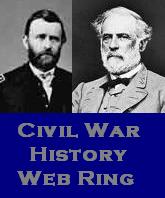While the majority of posts on this blog center on the Civil War, I would be remiss if I failed to mention a much more modern cavalryman receiving the nation's highest award today. Major (Ret) Bruce Crandall was supporting the 2nd Battalion, 7th Cavalry when he earned the award. The TV report showed him proudly wearing his stetson and dress blues (that he was wearing his spurs also is a pretty safe assumption) as the President hung the award around his neck in a ceremony at the White House today. The story as released by the AP follows. Well done, Bruce.
Pilot Gets Medal of Honor 41 Years Later
By PAULINE JELINEK
AP
WASHINGTON (AP) - Bruce Crandall was a soldier once ... and young. As a 32-year-old helicopter pilot, he flew through a gantlet of enemy fire, taking ammunition in and wounded Americans out of one of the fiercest battles of the Vietnam War, Army records say. Now, a week after his 74th birthday, Crandall will receive the nation's highest military honor Monday in a White House ceremony with President Bush . "I'm still here," he said of his 41-year-wait for the Medal of Honor. "Most of these awards are posthumous, so I can't complain."
Crandall's actions in the November 1965 Battle at Ia Drang Valley were depicted in the Hollywood movie "We Were Soldiers," adapted from the book "We Were Soldiers Once ... And Young." At the time, Crandall was a major commanding a company of the 229th Assault Helicopter Battalion, 1st Cavalry Division (Airmobile). "We had the first airmobile division ... the first one to use aircraft as a means of transportation and sustaining combat," Crandall said. His unit was put together earlier that year to go to Vietnam and "wasn't as thought out as things are today."
He didn't have gunners for his aircraft. That's why he flew unarmed helicopters into the battlefield. He didn't have night vision equipment and other later technology that lessens the danger of flying. The unit had "minimum resources and almost no administrative people" - thus the lack of help to do the reams of paperwork that had to be sent to Washington for the highest medals, Crandall said.
Generals in-theater could approve nothing higher than the Distinguished Flying Cross, Crandall said in a phone interview from his home near Bremerton, Wash, so he received that award. Through the years, he was able to get that upgraded to a Distinguished Service Cross and now to the Medal of Honor. Crandall was leading a group of 16 helicopters in support of the 1st Cavalry Division's 1st Battalion, 7th Cavalry Regiment - the regiment led by George Armstrong Custer when he met his end at the 1876 Battle of the Little Bighorn, or "Custer's Last Stand."
Without Crandall's actions, the embattled men at Ia Drang would have died in much the same way - "cut off, surrounded by numerically superior forces, overrun and butchered to the last man," the infantry commander, Lt. Col. Harold Moore, wrote in recommending Crandall for the medal. Moore, now a retired three-star general, later wrote the book about the battle along with Joseph L. Galloway, a former war correspondent now with McClatchy Newspapers.
"This unit, taking some of the heaviest casualties of the war, out of water and fast running out of ammunition, was engaged in one of the fiercest battles of the Vietnam war against a relentlessly attacking, highly motivated, vastly superior force," said U.S. Army documents supporting Crandall's medal. The U.S. forces were up against two regiments of North Vietnamese Army infantry, "determined to overrun and annihilate them," the documents said. The fighting became so intense that the helicopter landing zone for delivering and resupplying troops was closed, and a unit assigned to medical evacuation duties refused to fly. Crandall volunteered for the mission and with wingman and longtime friend Maj. Ed Freeman made flight after flight over three days to deliver water, ammunition and medical supplies. They are credited with saving more than 70 wounded soldiers by flying them out to safety, and Freeman received the Medal of Honor in July 2001. Paperwork and other parts of the process delayed Crandall's medal until now, officials said.
Thinking back to the Vietnam battle, Crandall remembers the first day was "very long ... we were in the air for 14 and a half hours." He also thinks of how impressive and calm the unit on the ground remained, saying Moore and his commanders were "solid as rocks" throughout the fight. And of course, Crandall says, he's also proud of his own performance. "I'm so proud that I didn't screw it up," he said.
Monday, February 26, 2007
Subscribe to:
Post Comments (Atom)


No comments:
Post a Comment